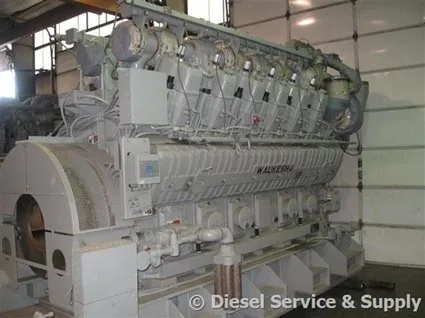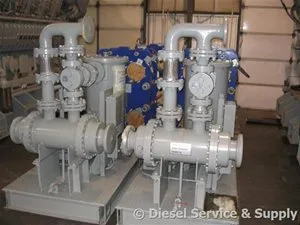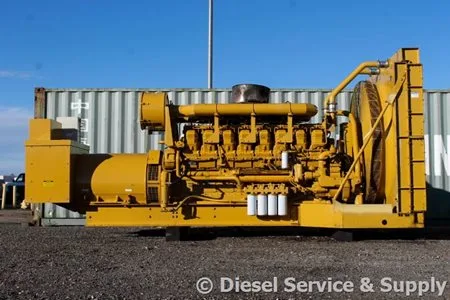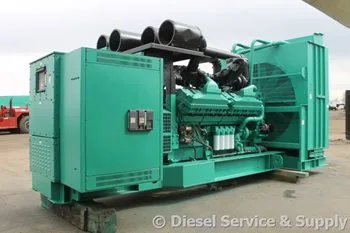Natural Gas Generators
Overview of Natural Gas Generators
A widely used and efficient means of generating power is by using a natural gas generator. Natural gas can be used to power both emergency and portable generators and is regarded as being one of the most affordable and effective fuels among non-renewable resources for power generation. In terms of affordability, coal is perhaps the only fuel that is less expensive. However, one of the biggest disadvantages of coal is that it is a high pollutant.
Natural gas is typically obtained in a manner similar to that of drilling oil. The liquid form is then transported to various areas where it is converted into its gaseous form. Thereafter, it is made available to people through pipelines and cylinders.
A natural gas generator works in a manner similar to other generators. In fact, the most basic difference between generators is the fuel that is used to power the units. In this case the source of energy to start the generator is natural gas. Such generators are commonly used in larger cities since the supply of fuel is made readily available through pipelines. But aside from its obvious advantages, natural gas generators also have several disadvantages.

Advantages of Natural Gas Generators
- The three most obvious pros of using natural gas as a fuel to power your generators is that it is cleaner, less expensive than other non-renewable fuels, and is considerably efficient.
- In comparison to oil and coal, the emissions of sulfur, nitrogen, and carbon dioxide (a greenhouse gas) are considerably lower. Hence, natural gas is one of the cleanest fossil fuels when it burns.
- Another advantage of natural gas generators is that natural gas does not produce a pungent odor, which is fairly common in generators powered by oil or diesel.
- Natural gas generators are also effective in reducing costs when used to power homes. This is because electricity from the main utility source is a far more expensive alternative.
- Apart from being cleaner and cheaper, natural gas is also readily available in large cities since it is delivered directly through pipelines. Hence, when using natural gas powered generators, storage of fuel becomes redundant.
Disadvantages of Natural Gas Generators
- When it comes to the cons of natural gas generators, one of its advantages can also be regarded as a disadvantage. Since natural gas need not be stored as it is supplied through gas pipelines, at times of natural calamities the supply of natural gas is disrupted. You may find yourself facing a lack of fuel when you need to operate your generator the most.
- Apart from this, natural gas is extremely explosive and can be a serious fire hazard should the pipeline burst.
- In comparison to diesel generators, natural gas generators are:
- More expensive to run
- Emit more carbon dioxide, which is a greenhouse gas.
- Moreover, natural gas is a limited or non-renewable energy resource.
Diesel Generators
Overview of Diesel Generators

Generators that use diesel to run are known as diesel generators. These can be typically divided into two basic parts: a diesel engine and an electrical generator. Diesel generators can be used to provide power to places that are not powered by a power grid or as a backup in case of a power outage. Diesel generators are also used in ships as an energy source and also for propulsion.
Diesel generators are extremely common as back-up units for emergency power supply. Available in both single and three-phase, diesel generators can be used not only in large establishments but also for homes and small offices.
Advantages of Diesel Generators
- In present times, when it comes to making choices regarding fuel, the most important factor is price. With the constantly increasing demand and steadily decreasing supply, fuel choice has become the most debated topic in almost every sphere. The key is to find a fuel that is cost-effective as well as energy-efficient. In this regard, diesel generators score high. While they are a considerably more expensive alternative in comparison to natural gas generators, since the price of diesel is more than that of gas, diesel has a higher energy density. In other words, while you may pay more for the diesel, you will also get more energy out of the diesel than you would for the same volume of gas. Hence, fuel efficiency is by far the single most important advantage of diesel generators.
- Another big benefit of installing a diesel generator is the assurance of a steady power supply. In establishments such as hospitals, this plays a significant role because most of the machines used require constant power and one power outage could mean the difference between life and death.
- In comparison to a generator powered by gasoline, the diesel generator is far more efficient for several reasons as follows:
- Diesel engines that are presently used are much-improved versions of earlier models that were a nuisance due to high noise and heavy maintenance.
- Diesel engines are much more sturdy and reliable.
- Another big advantage over gas engines is that diesel engines do not require spark plugs or wires; this helps in reducing maintenance costs.
- The lifespan of a gas engine is much shorter than that of a diesel engine.
- Finally, being less flammable than other fuel sources, diesel generators also score high on the safety front. Moreover, again the absence of spark plugs eliminates the risk of freak fires.
Disadvantages of Diesel Generators
- One significant disadvantage of a diesel generator is that it can be considerably expensive in comparison to other generators. However, since the maintenance cost of a diesel generator is quite low, it more than makes up for the initial investment.

- Noise has always been an issue with regard to diesel generators. While the newer models are designed to be quieter, the older variants can still be considerably noisy. This means that if the generator is being used in areas that are heavily populated, residents may complain of noise pollution from your generator unit.
- Another drawback is that diesel generators are bulky and comprise large and heavy components. Thus, as opposed to smaller and lighter generators, diesel generators may not be the most preferred portable unit.
- Finally, given the recent trend of environmental awareness, diesel is also considered to be a major pollutant in certain areas.

Conclusion
When it comes to choosing between diesel and natural gas generators, you will first need to answer two important questions:
- What is the main purpose that your generator will serve?
- How much are you willing to pay for your generator unit?
While both natural gas and diesel generators have their advantages and disadvantages, with the advent of biodiesel, which is far more environmentally friendly, diesel/biodiesel generators could become extremely popular.